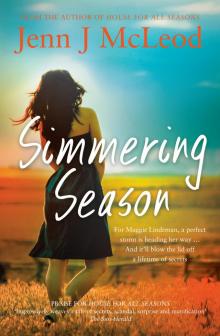- Home
- Jenn J. McLeod
A Place to Remember Page 14
A Place to Remember Read online
Page 14
‘You have one,’ Ava would say, wishing one parent had been enough.
‘But he’s not here.’
‘We’re still a family, Nina, even without Dad.’
How could she make her daughter understand when it had taken Ava years to understand herself? That no matter whom she dated, or slept with, something always prevented her from giving her heart completely. John Tate was that something and to this day her heart waits, refusing all others, because it knows what the swell of real and lasting love feels like when someone fills a heart to bursting.
A knock on the car window startled Ava. She lowered it.
‘Sorry, love, you might be right about that bloody bird being smarter than me. I forgot to give you this.’ The motel proprietor dangled a key attached to a plastic T-bone steak. ‘Everything all right? The room number’s right there on the door. Number thirty, love. Not an unlucky number, is it? I’ve struck that a few times.’
‘Yes, I mean no. Any number is fine. Perfect, thank you.’
‘Okay. Enjoy your stay, Ms Marchette, and let me know if I can do anything else. I’ll be in the office teaching my old mate how to answer the phone, see if I can’t work out how to get a few days off and leave the bird in charge.’
Ava appreciated the country hospitality and fell back into the car seat. Did she think she could come all this way and not find herself lamenting numerous what ifs, even though she’d enjoyed a good life with her children and was more fortunate than many. Was she returning to Ivy-May out of some sense of guilt because she’d had a good life, even if it was without John?
Martin had been close to breaking down her barriers, coming into her life at the perfect time. A quiet, gentle man who’d lost his wife years before, then lost himself in the chaos of corporate life, he had found fulfilment with Ava and had taken her on a P&O cruise each year. They’d managed eight trips and were on their way to Martin’s goal of Captain’s Club status when he’d fallen ill. That man had broken a little piece of Ava’s heart when he’d died, and her daughter, Nina, was devastated.
She shuddered. Time to get out of the car and under a hot shower.
Chapter 24
Moon over Moo-tel
Feeling better with the day’s grime washed away, Ava wondered why she hadn’t planned her arrival at Ivy-May after a good night’s sleep.
‘You know why,’ she murmured. There would’ve been no sleep tonight had you not got that initial meeting out of the way! She filled the kettle in the bathroom, switched it on and made a cup of tea.
She thought about when Nina and Tony had left the nest almost simultaneously, as twins often do. Ava’s zest for life had been sucked right out of her. Not long afterwards, doctors had discovered the damage to her body. The pain she’d been experiencing wasn’t over the children leaving but an insidious and rare virus attacking her heart.
‘It’s strong for now,’ the doctor had explained. ‘But take things easy. Maybe it’s time to give up work, relax and make the most of life. And, Ava, try not to worry so much.’
Not worry? She had a ticking time bomb counting down to an indeterminate detonation!
Ava dimmed the lights and turned on the TV, muting the sound. She settled on the bed, wedged three saggy pillows behind her back and tried to relax, but the strobe effect of colourful commercials conjured a memory: John, the Basmorra fair, fingers sticky with candy floss, and Sideshow Alley’s Wheel of Fortune. She’d only thrown the stuffed toy away after that doctor’s appointment when she’d packed up her life to move into a smaller place.
Suddenly her daughter’s ringtone was sounding from the phone at the foot of the bed. ‘Hello, darling.’
‘Mum, where on earth are you? You missed a specialist’s appointment today.’
‘Did I? Good heavens, I’d completely forgotten. Where are you calling from, Nina?’
‘Your front door. You haven’t left a note. You haven’t brought in your paper. Mrs Hense said you drove out of the driveway at some ridiculously early hour.’
‘Mrs Hense doesn’t miss much and nosy neighbours like her usually have a tendency to exaggerate. I’m going to be away for a few days.’
‘Away where?’
‘Did I not mention the health retreat?’ Ava choked on the lie she’d prepared. ‘I decided a few days relaxation might be nice.’
‘On your own? If you’d told me I might’ve arranged to come with you to share the driving, except I have the franchisee conference to organise. You could have waited a week.’
‘Driving isn’t a problem and I’m quite enjoying the change of scenery.’
‘Mum, where are you exactly? Where is this health retreat? And why didn’t you discuss it with me? Does Tony know? Are you still driving and talking on the phone? How many times have you lectured Tony and me?’ With each question the pitch in her daughter’s voice crept closer to tantrum tone, a trait that hadn’t changed since Nina was five years old and begging for answers with successive ‘buy whys’.
‘It’s late, darling, let’s talk tomorrow.’
‘Is this retreat on the doctor’s advice, Mum? What are they doing for you? Have you—’
‘Hello? Hello, Nina, are you there? Can you hear me, sweetheart? Hello?’
‘Please don’t pretend the reception’s no good. I’ve pulled that one myself a million times. I’m genuinely concerned.’
‘Why, darling? What’s making you so clingy all of a sudden?’
‘I’m not being clingy.’ The growl of frustration was a warning Ava recognised. ‘If you’d bothered to reply to one of the dozen texts I’ve sent you’d know Tony’s been wanting to tell you all is good with Mariska and the baby. You said you wanted to hear the ultrasound results as soon as they were in.’
When Ava glanced at the phone she noticed, for the first time, the flashing message indicator. ‘Oh, I see them now,’ she said guiltily. ‘It’s this new phone. Perhaps I need to check the settings. Mind you, in a motel built like a concrete cell block the reception might be a bit tricky.’
‘Motel? I thought it was a fancy health retreat.’
‘Yes, Nina, that’s right, and they’re calling me for tea. They have this herbal sleepy time blend. Very relaxing, I’m told. As for Tony, I’ll call him. And, Nina, there’s no need to worry about me. I love you. Talk soon.’
Ava pushed the end-call button. She also pushed away the guilt that accompanied lying to her daughter – a rare occurrence, but necessary under the circumstances. Perhaps she would explain this trip to Nina one day. Or not. Some things a daughter never needs to know.
With her tea now cold, Ava switched off the television, dragged the quilt over her and rolled onto one side to stare out of the window. With no visible clouds the giant pewter-coloured moon was putting on quite a show with a chorus line of stars. How many nights had she sat on the porch of her little cottage watching the sky as she waited for John?
The years might have changed John Tate – the paint-spattered tracksuit pants and mismatched rubber clogs in place of jeans and riding boots clear enough – but she’d also changed. Ava Marchette was no longer easily turned away or discouraged. She had nothing to lose now but time, and time was the one thing she planned to make the most of.
Tonight she’d check in with her son and his wife. Tomorrow would be a new day and she’d wake up refreshed and glad to be back. Time to embrace her purpose and focus on the sights, sounds and smells of the Candlebark Creek countryside. She would return to Ivy-May tomorrow and try again.
And don’t give up so easily this time!
Chapter 25
Brain Clutter
Although he’d slept fitfully, John woke early, his mind – usually cluttered with colours and shapes – was filled with thoughts and images of the woman who’d knocked on his door all but demanding he paint her portrait. He huffed at the stubborn moon loitering too long outside his bedroom window and smiled to himself in the dark. Ava Marchette had gumption, he had to give her that much. And John should know: he
seemed to be a target for ballsy women. Even his wife, once a respectful teenager, had turned defiant after marriage and John often caught himself wondering what it was about Katie that had made him choose to be with her for life. How had his best mate become his wife and the mother of his baby? Wasn’t a fella supposed to remember those moments? All John knew was that the happy event had been brought forward to accommodate a newborn’s arrival date, and that moving his family of three into Ivy-May had drawn invisible battle lines.
Marjorie had insisted on the shared living arrangement so she could continue to care for John post-surgery and help with the baby. But the matriarch had met her match in her new daughter-in-law, who soon started speaking out. Overnight, it seemed, Katie and Marjorie’s relationship went from one of mutual admiration and respect to disagreeing on almost everything. They’d argued about what was best for John and the baby, and the plans to develop Ivy-May into a bigger, more profitable B-and-B business. Their quarrels had played out in various ways: shouting, silent staring matches over the dinner table, and whispered disputes behind closed doors. John had even asked his mother if marrying Katie had been the wrong thing to do.
‘Why on earth would you ask that?’ she’d snapped.
‘Because the two of you used to get on so well. You do nothing but argue these days.’
‘Marrying Katie O’Brien was the right thing to do under the circumstances.’ Under the circumstances was code for the baby John couldn’t remember siring. Marjorie had lectured that he was never to let Katie hear him say such a thing. ‘You two were destined to be together. Everyone expected you’d tie the knot. The baby simply brought forward what was meant to be. That’s all.’
‘Don’t get me wrong, Mum. I love Blair and I appreciate everything Katie’s done around the house since my illness, but—’
‘No buts about it, John. Your wife’s become the backbone of our little business, and without Katie in the family Ivy-May’s financial future would’ve been in doubt.’
‘What’s that mean?’
‘Just that your father and I can’t keep up the same pace now, and you know as well as I do the cattle industry is changing. You don’t remember what is was like, John. Life on the land was not getting easier. We’re relying on you and Katie and the diversification strategies that include the O’Brien place. You need to pull your weight around here, John. Put the paintbrushes down more often and step outside.’
‘If only I felt the same desire to work. You know how much I used to love this place. I get up early in the hope of clearing my head, but I don’t want to do anything except draw. I don’t feel the same way about Ivy-May. The need to work the land is no longer there, and as much as I try with Katie I—’
‘Stop, John. I won’t hear this talk. The outcome of your brain injury could have been so much worse. You’re alive, you have a future. Give yourself time and focus on how much you love Katie and little Blair.’
‘That’s just it, Mum. I can’t remember falling in love with Katie. One minute we’re mates and the next we’re married. How did that happen? I don’t remember feeling anything close to—’
‘Shush, John. I’ve told you before, such talk will break Katie’s heart. You have a wife and a baby, and family comes first. So, enough with the painting and shirking your responsibilities.’ Time for some tough love. ‘If you want to feel like you once did about your wife and your life then I suggest you get dressed, start taking an interest in the property and do your share. Your father needs help on the crush today and Katie is exhausted with Blair teething.’
As beautiful as the baby was, Blair’s arrival had strained relationships to the point where John no longer knew who cried more, his wife or the child. His mother had used the term post-natal depression to describe Katie’s rants and tearful outbursts in the weeks and months after giving birth, while poor Colin, always the quietest person in the Ivy-May household, found himself much maligned. John had come home from hospital to a house full of people who didn’t love each other much. He once talked to his father about the situation, but Colin’s only advice had been to sit tight. ‘Let the atmosphere clear and wait until the hormones swing in a more favourable direction for a husband,’ he’d said. ‘No bloke does any good interfering in his wife’s relationship with her mother-in-law.’
In the end it was Katie who kept clear of everyone by involving herself in various Basmorra district committees. ‘Networking,’ she’d told John one day. ‘It keeps the Ivy-May B-and-B at the front of people’s minds and that creates referrals. We used to talk about me taking the lead with the marketing stuff, remember?’
No! John had wanted to say. I don’t remember. That’s the problem, Katie. That discussion, along with numerous others, must have taken place in what became known in the household as John’s lost years.
Lost, the term, so freely thrown about, made his blood boil.
Lost, like he’d lost his watch, or lost his money picking a dud horse in the Melbourne Cup.
Lost, as if simple carelessness on his part had caused his condition.
In truth, he’d lost more than years. He’d lost his interest in all the things he’d once loved: getting up before sunrise and saddling his favourite horse to separate the mob; the challenge of working up to three and four hundred beast at a time to rotate the herds through the yards as various farming practices demanded, as well as through the paddocks as feed and weather necessitated.
There had once been no better feeling than that of his body at one with his horse’s, riding the ridgeline while he thought up ways of doing things better, once the place was his to change. A fifth generation in these parts, on a cattle property the size of Ivy-May, was rare. John had daydreamed away those long hours in the classroom planning how to keep the place in good shape for the next generation, and the one after that, until either bureaucracy, political folly or the changing climate destroyed farmers. When his son was born, nothing became more important to John than being the one to teach Blair what he would need to know to take over. But John had learned the hardest of lessons. No plan is guaranteed. Whatever had happened to his brain one night on a trip to Brisbane – a strange destination for a man who disliked big cities – had made him forget a chunk of his life, along with the reasons he bounded out of bed every morning and collapsed back into it every night. At least in baby Blair he’d found a mate, and John loved being alone with him, Blair with his crayons and John with his paints.
The moon outside the bedroom window disappeared, blanketed by a cloud mass that had turned the bedroom so dark John could hardly make out the fingers he held in front of his face. How did something as ethereal as cloud make such a difference so immediately and profoundly? When he’d retired for the night, the sky had been clear, the stars bright. Life at Ivy-May had seemed to change just as quickly after his illness, but nothing as obvious as cloud cover allowed him to understand why everything was suddenly a fog, faces and events unrecognisable, his life altered for ever.
Whatever had happened to him and Katie being lifelong mates, content in each other’s company and excited about the future for their respective properties? Surely a happy and much-anticipated union, and a child so quickly on the way, should have brought everyone closer. Didn’t babies do that? John remembered his mother saying often that Katie had been the daughter she’d always wanted. Perhaps Colin had hit the proverbial nail after all and the constant power shift in the household had been about hormones. He’d even likened Marjorie and Katie to a couple of head-butting heifers. And that was how things had been at Ivy-May for a long time: Katie sulking, Marjorie yelling, and Colin keeping clear by training new staff to replace John who, in his mother’s words, was a disappointment and quite useless.
Eventually, it was baby Blair who brought love back into Ivy-May, blunting the barbs and softening the sharpness that edged every conversation. What John had told Ava Marchette about himself today was true. He loved his son so much that should Fate ever offer him the chance to relive those lost years,
he’d happily choose oblivion, if going back would result in him never knowing the son who was the only thing to drag John away from his art.
As he often did when sleep evaded him, John turned on the television but muted the late-night kitchen-gadget guy who could normally sell a dog trap to a dingo. He was demonstrating some new machine and over-stuffing sausage casings in the process.
‘It’s not that hard, mate,’ John yelled at the television. He could manage the task with his eyes closed. His dad had bought an old sausage-maker from a man at the pub as John’s fifteenth birthday present, and word soon spread about his knack with new flavour combinations, adding chilli or garlic to his sausage meat, and blending in different spices and the herbs that grew in pots around the main homestead. John, the kid who’d made lemonade from lemons, had dreamed big and worked hard, so it wasn’t long before he was using homemade sausages as a kind of currency to barter with locals: his sausages in return for whatever he needed.
John flicked through the TV channels, finally switching off, the room dark once more. He’d had no trouble recalling the sausage-making process. The country music he would play in the meat house helped his hands get into an easy and repetitive rhythm to ensure a consistent end product. He’d only just remembered experimenting with different flavours, though, and it made him smile. As did the face Katie had pulled when he’d asked her to help him break down a beast.
Colin used to say, ‘The important thing is to respect the beast by wasting nothing.’ Admittedly Katie had been barely a teenager when John had first mentioned it, but as she was a cattleman’s daughter he figured she’d be cool. He grew to learn, however, that while his wife made a good job of just about everything she set her mind to, she was even better at the tasks someone told her she couldn’t manage, except when it came to helping out in the meat house.

 A Place to Remember
A Place to Remember Simmering Season
Simmering Season Season of Shadow and Light
Season of Shadow and Light House for All Seasons
House for All Seasons Other Side of the Season
Other Side of the Season